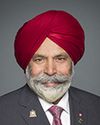I will use diabetes as an example. One in 16 New Zealanders has type 2 diabetes, so there are about 250,000 type 2 diabetics in New Zealand in a population of 4.7 million.
Again, it's not just us saying this. I understand, from looking at your formulary, that diabetics in Canada can get access to three different classes of diabetes medicine, such as GLP-1s, DPP-4s, etc.
In New Zealand we have metformin and sulfonylureas and insulin, which is more for type 1 diabetics. Clinicians and specialists have basically argued in the public domain that type 2 diabetics need to have access to some, not all, of these medicines, because they help reduce the comorbidities of diabetes, which at the moment cost New Zealand about $1.1 billion a year.
These are medicines that you get in Canada. These are medicines that are recommended in international guidelines for the treatment of diabetes, and at the moment type 2 diabetics in New Zealand aren't getting access to them. Mainly it's 10% to 20% of type 2 diabetics who actually really need these. It's great to have metformin, but we need these other medicines.
It comes down to getting a good balance. It does have an impact on the chronic disease burden if you're not getting the right treatments that clinicians know would make a difference.




